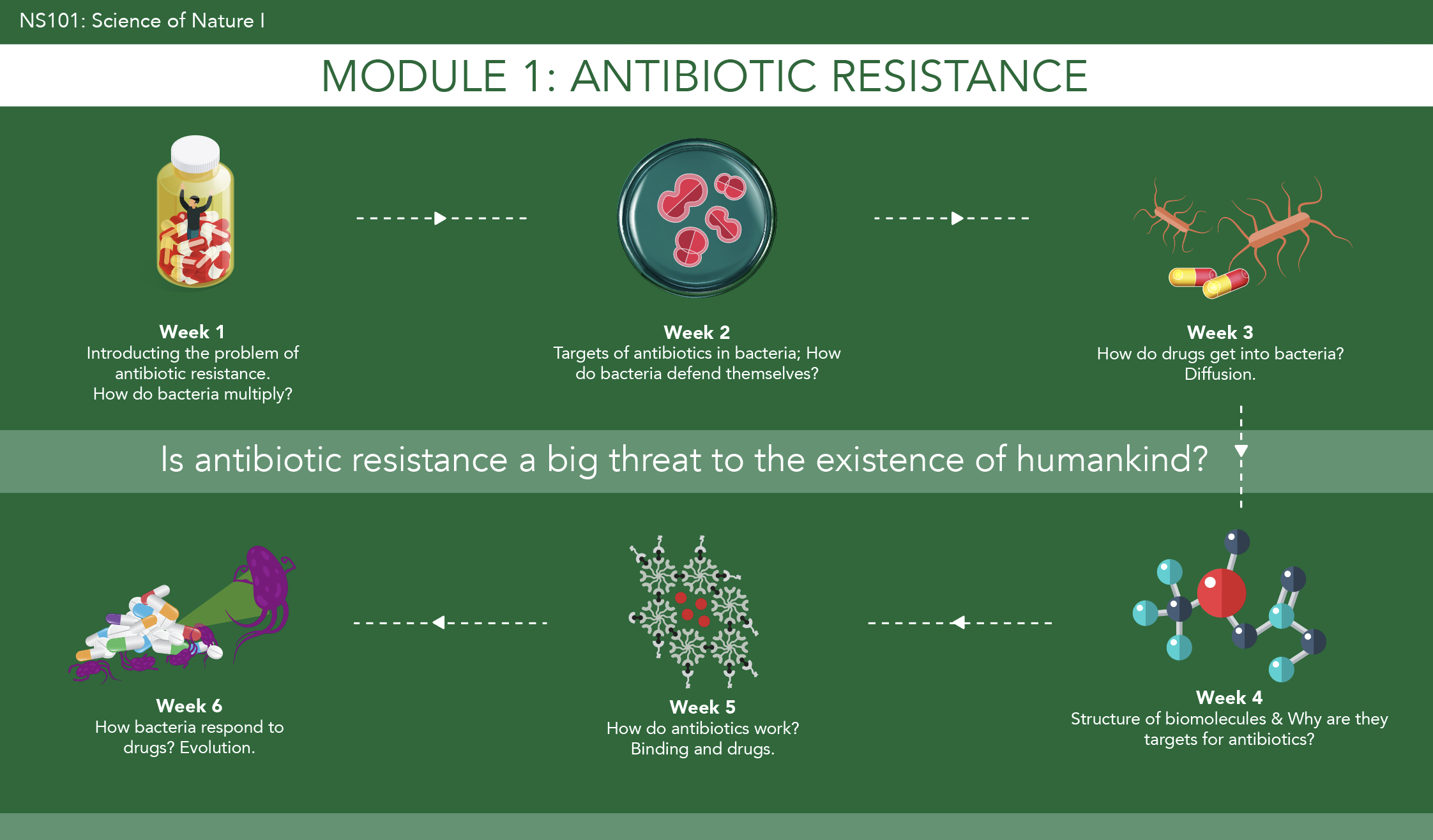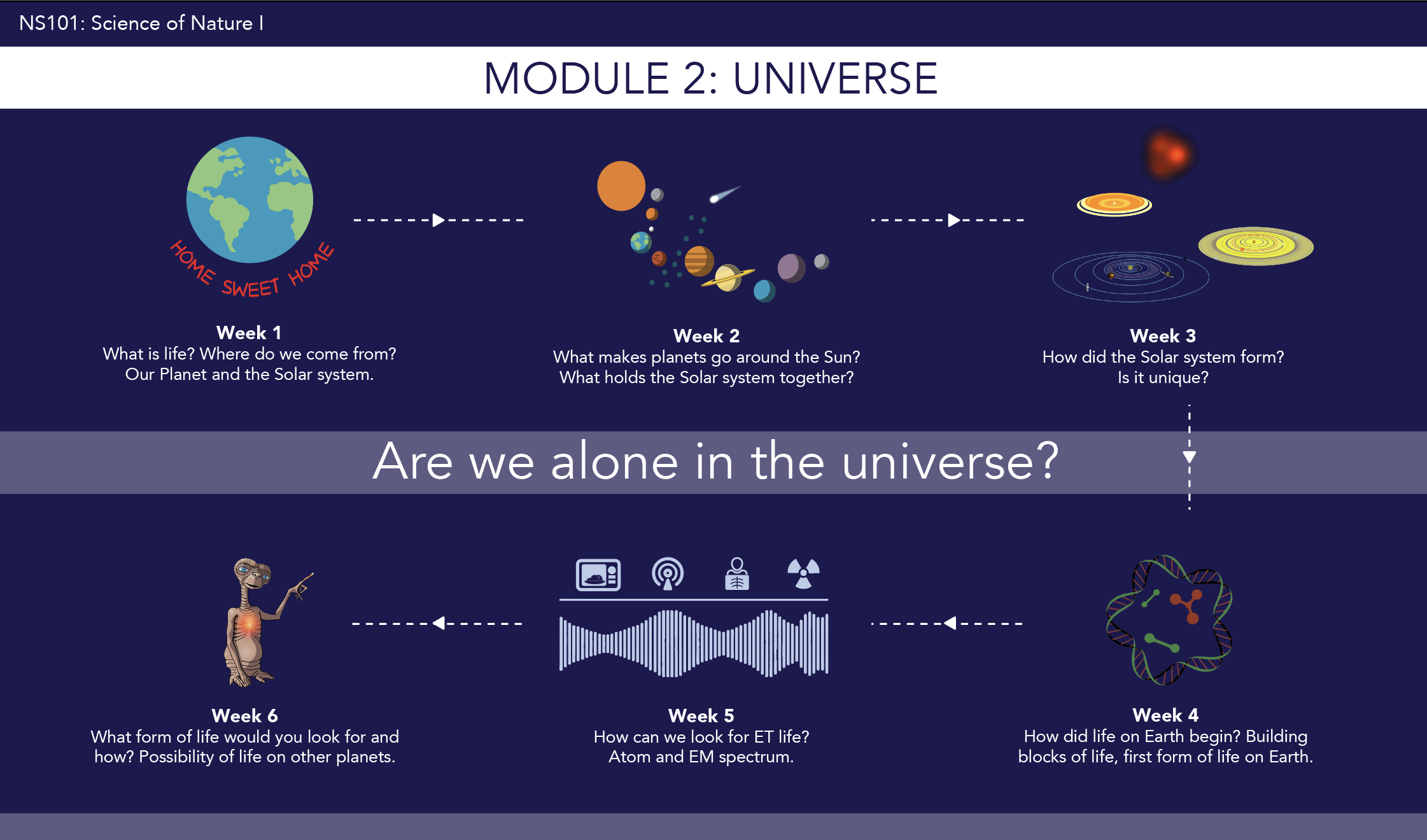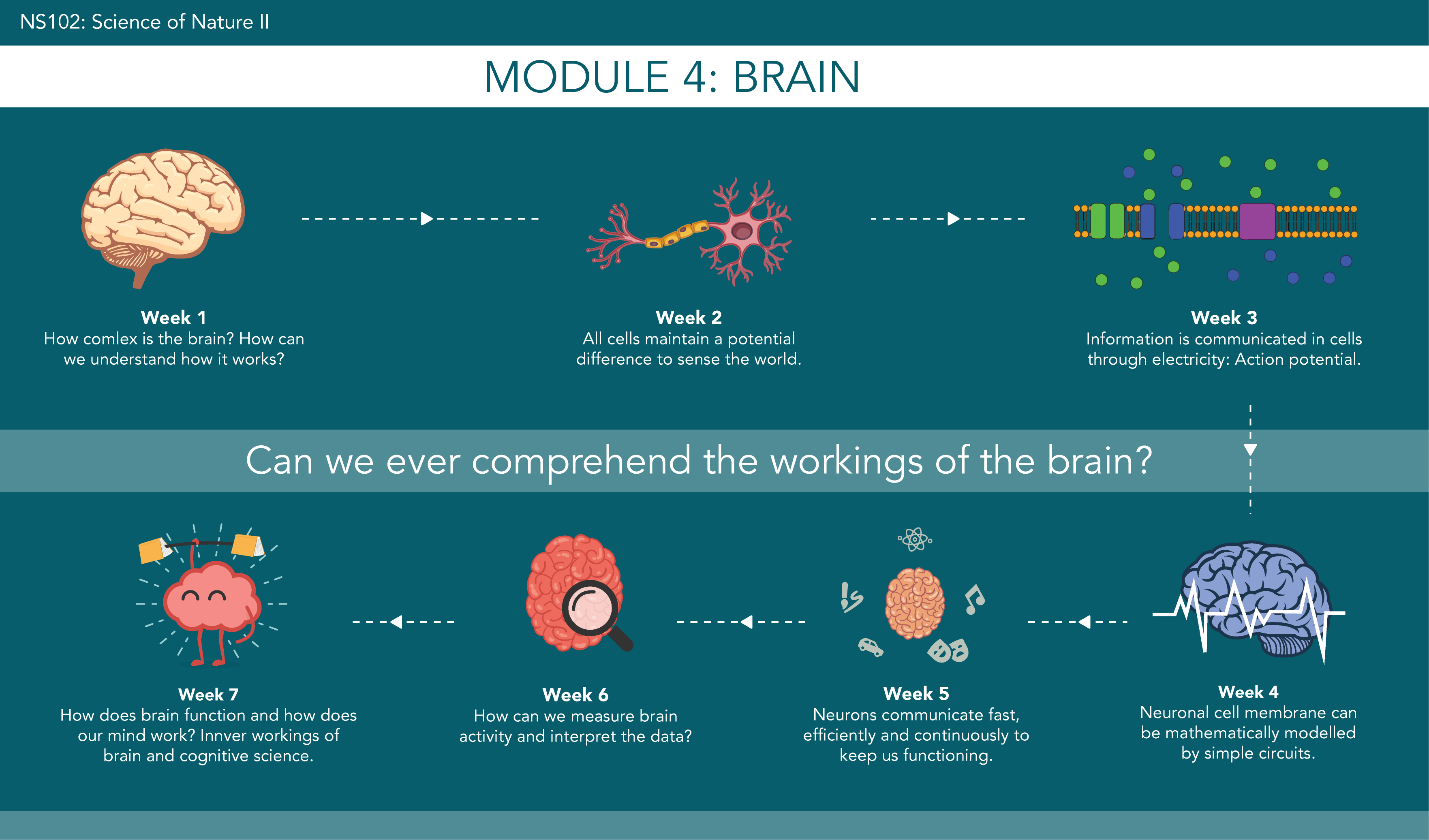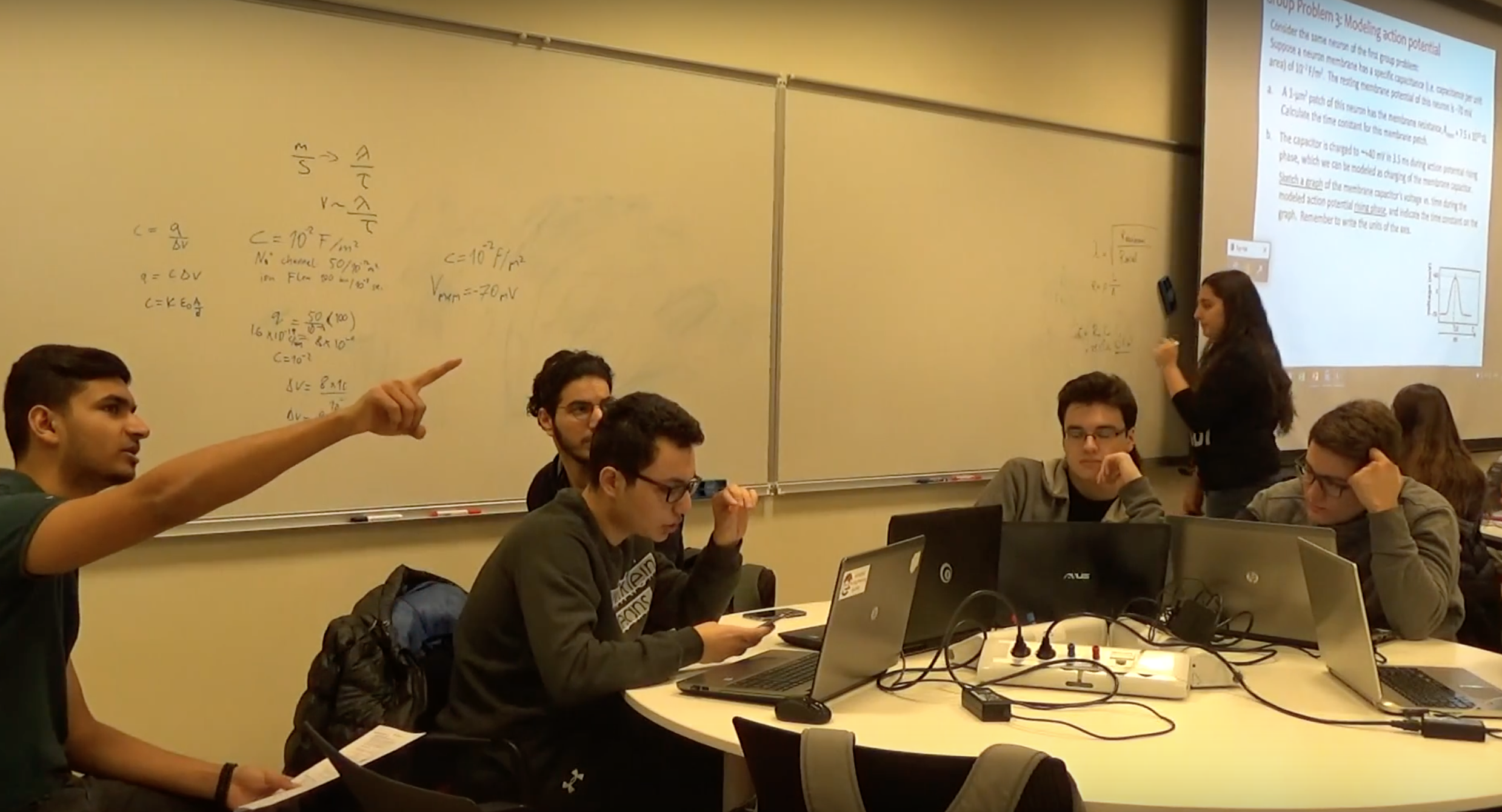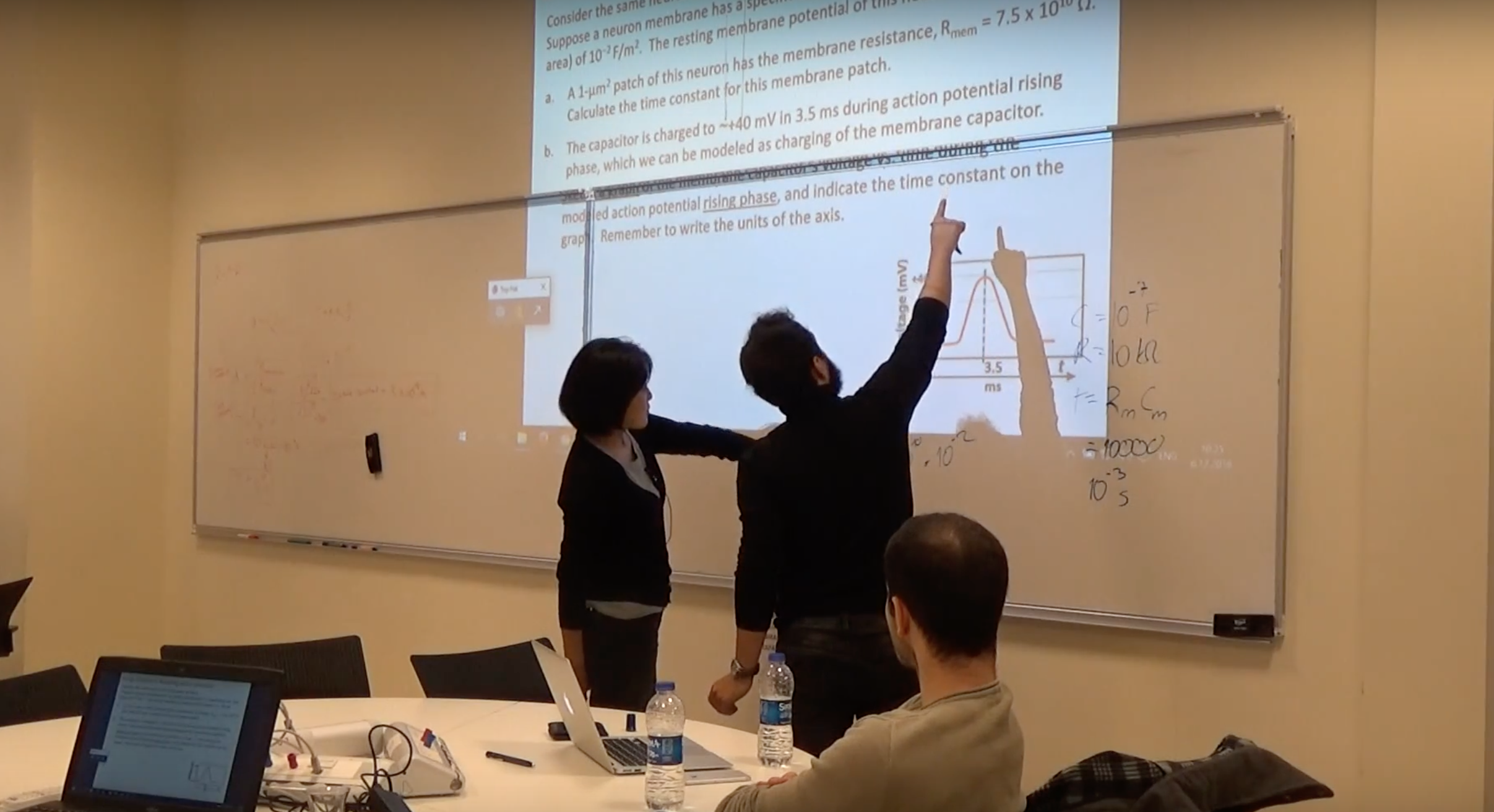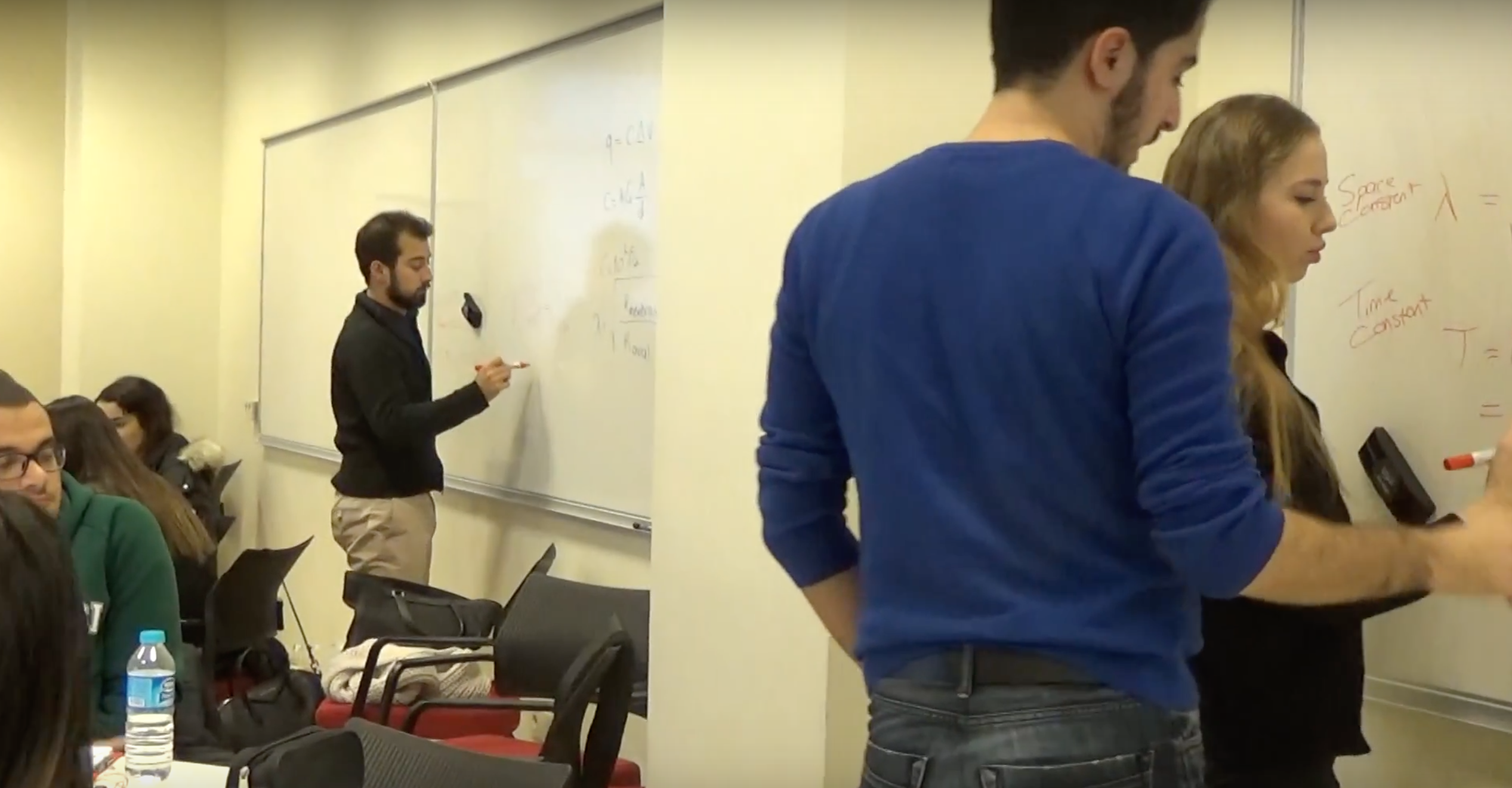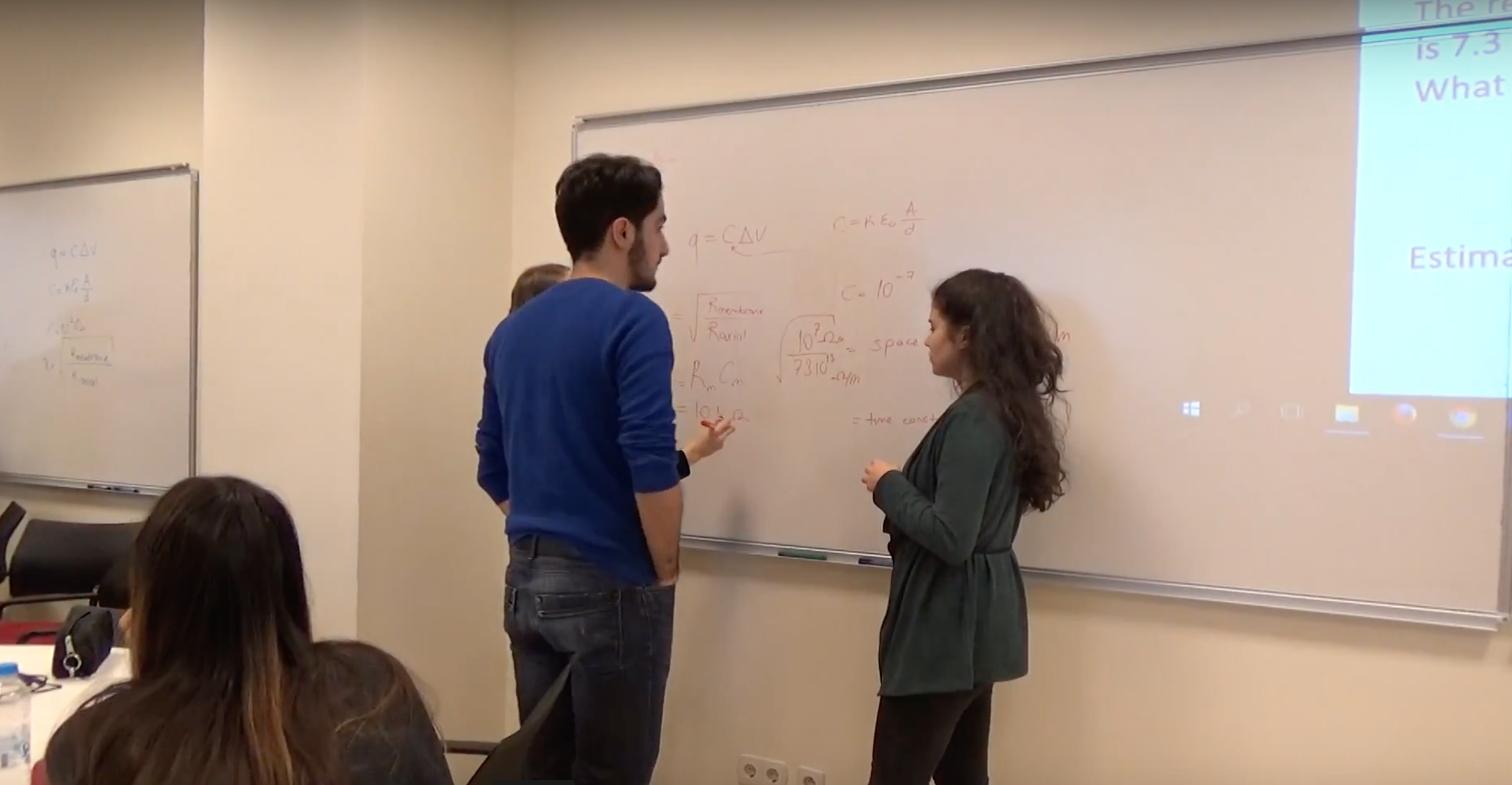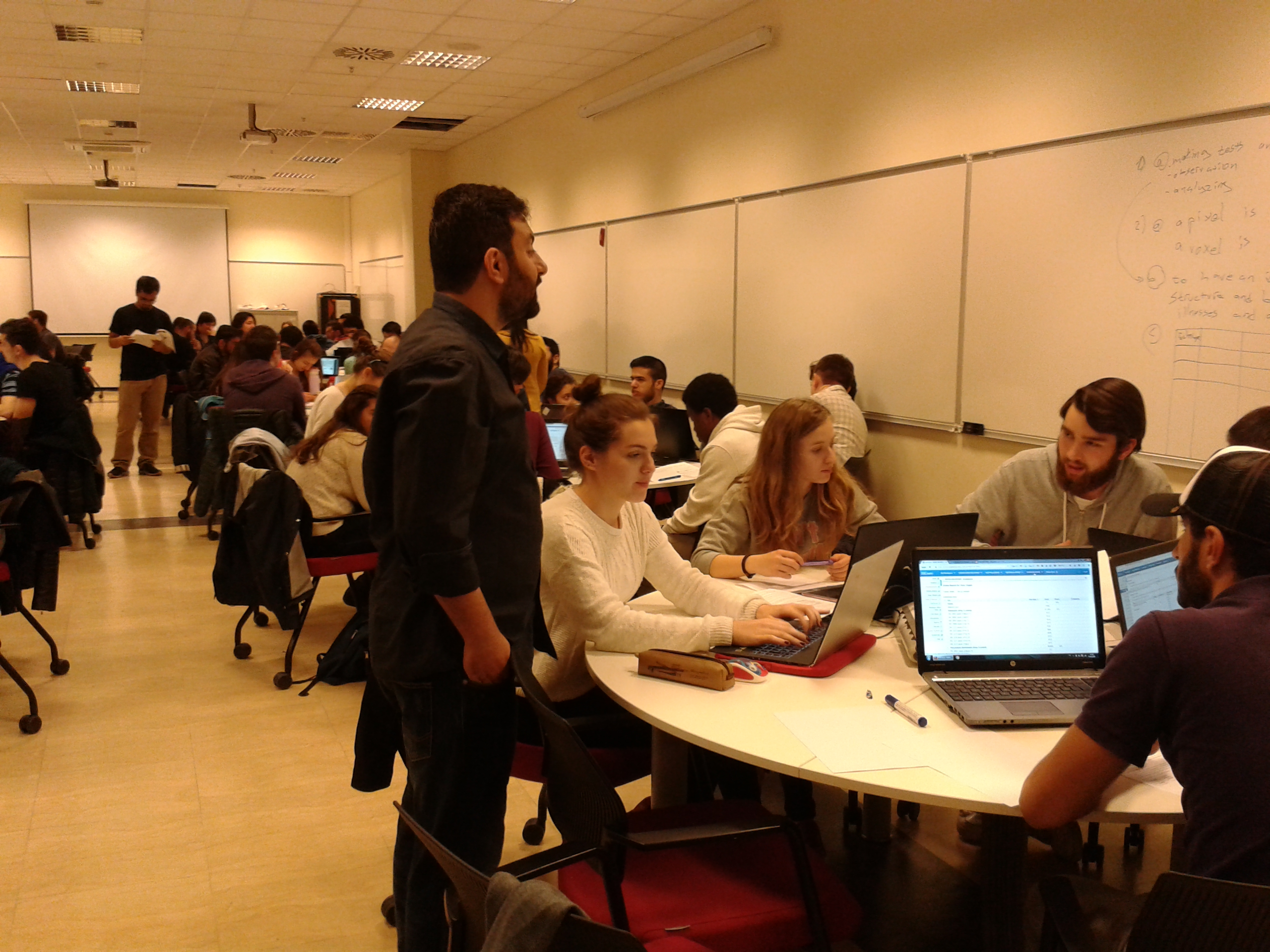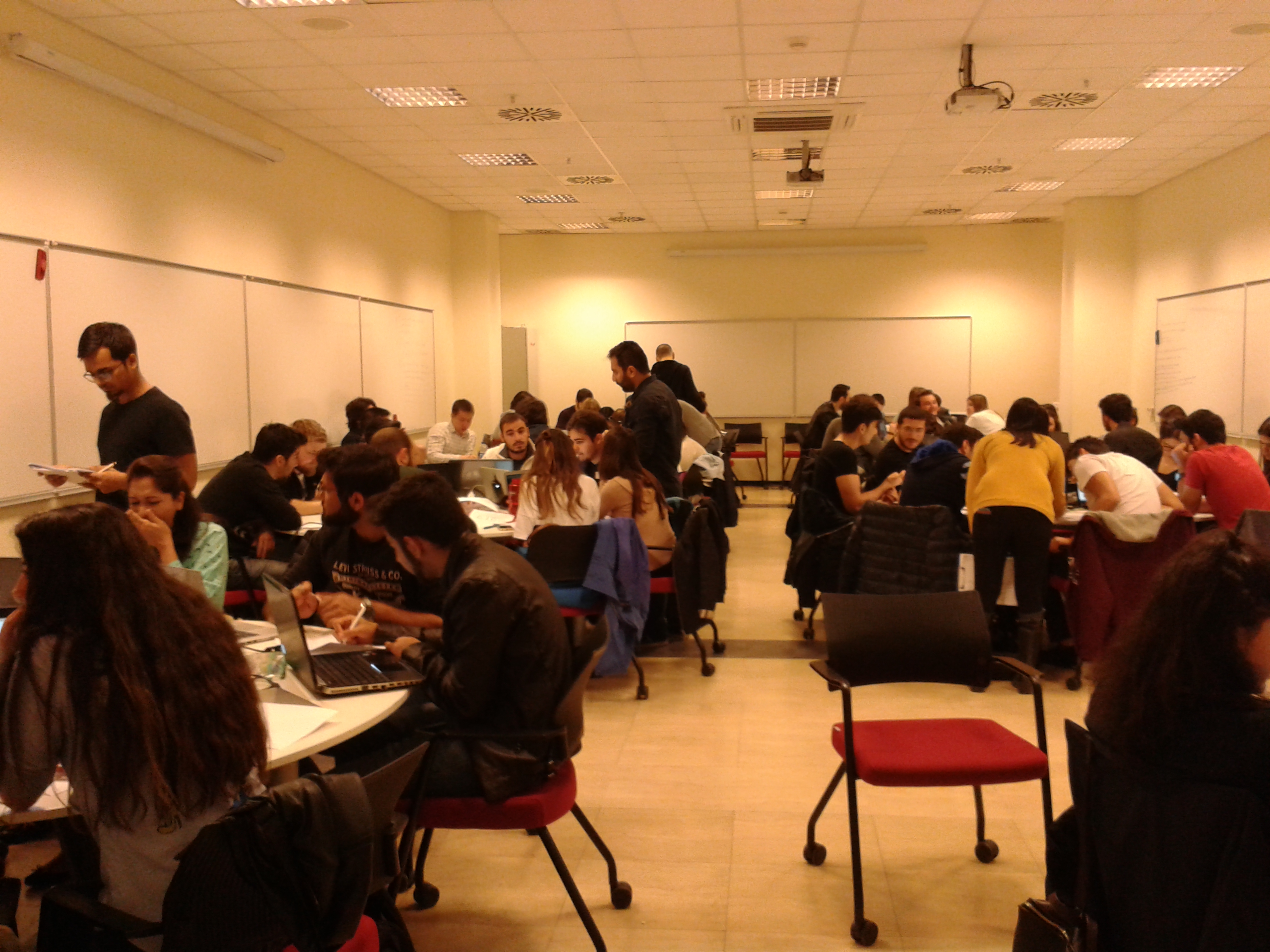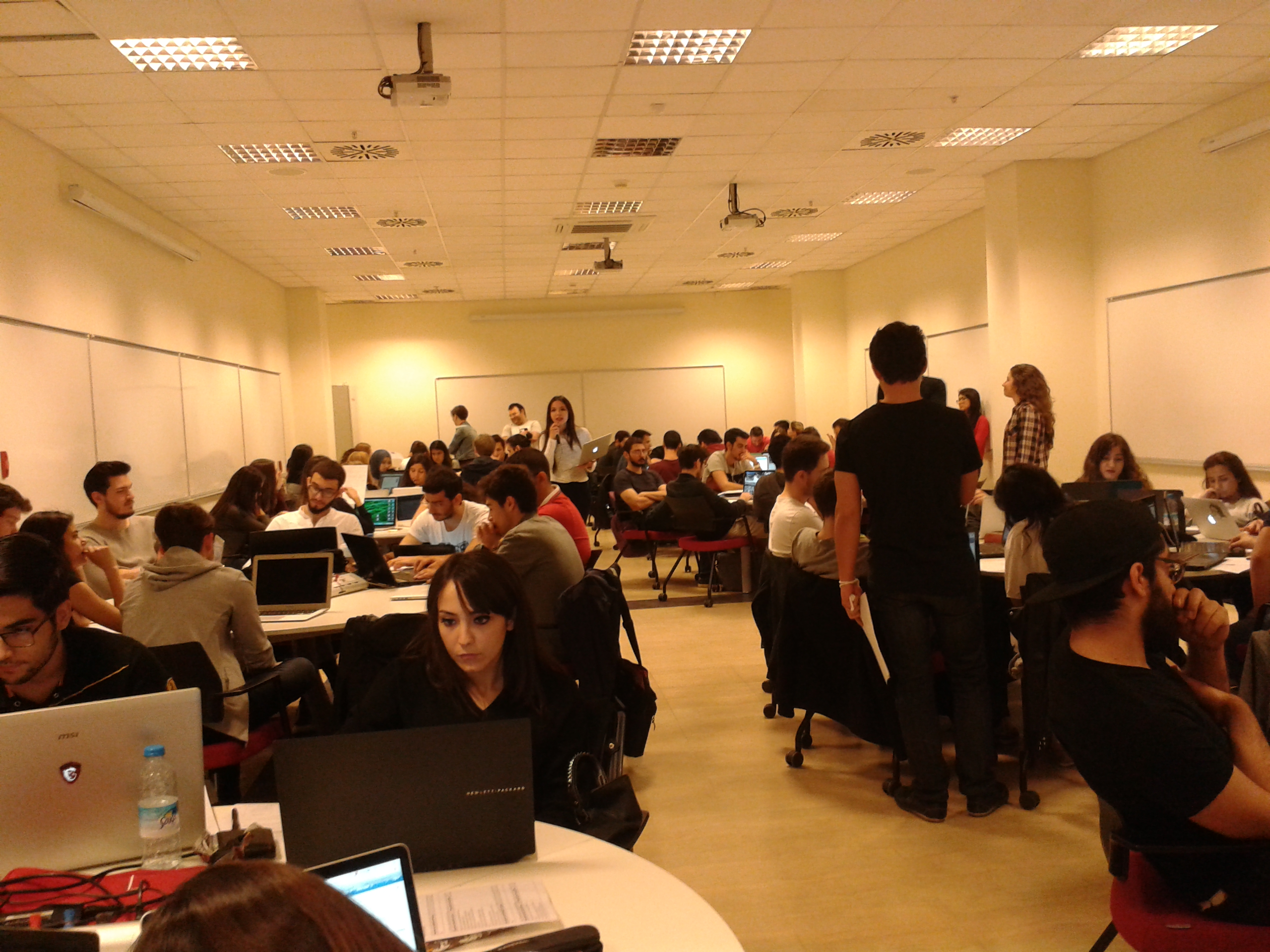Contents
Learning Objectives
Check out the following links to see the list of weekly Learning Objectives of NS101.
Module Posters
Click on posters to view.
Example Materials
SU implements a Learning Management System called “SUCourse”, based on
Sakai and managed by our IT unit. All NS course materials are shared with
students on SUCourse, organized by module weeks.
Click to see an example SUCourse
page of Week 1 of the Universe module.
Syllabus
Course Book
There is no course book. There will be weekly resources provided on SUCourse
under the module page (Universe Module or Antibiotic Resistance Module).
Recommended Books
"Conceptual Integrated Science", P. G. Hewitt (available
in the Information Center, on student reserve)
"Science of Nature I", M. A. Alpar (PDF version available
on SUCourse. Turkish version,
"Doğayı Öğrenmek - Fizik" will also be available at the Information
Center, on student reserve; several copies available for purchase at Homer)
Top Hat (Online Response System)
In lectures, we will be using an online response system called Top Hat
accessible from
tophat.com on your web browser, or through free
Top Hat app if using tablet. If you have not used the system before, please
review this "Getting Started" guide before the first lecture. You must
log in Top Hat with your SU email account name or it will not be counted.
You must bring a laptop or tablet connected to SABANCIUNIV WiFi to each
lecture. All cell phones are to be kept turned off during the lectures.
In order to allow all students to use Top Hat efficiently, please
connect only one device to the internet during the lectures.
Science of Nature courses aim to initiate a curiosity and desire
for learning “scientific thinking” in students and at the same time to
introduce some of the basic concepts of physical, chemical and biological
sciences in connection with questions concerning the universe, nature and
our daily life.
The NS 101 course consists of two modules
“(1) Is antibiotics resistance a big threat to the existence of humankind?”
“(2) Are we alone in the universe” and
Scientific
methodology and fundamental concepts in the physical, chemical, and biological
sciences are introduced through an integrated approach in the framework
of these questions.
Upon completing NS101, students will be able to:
- Demonstrate skills for critical thinking, reasoning and problem solving through integration of different concepts and information.
- Distinguish among scientific laws, hypothesis and theory and use them to differentiate facts from fiction.
- Apply mathematical concepts to solve quantitative problems.
- Demonstrate fundamental knowledge of the terminology, major concepts and theories of one or more fields in physical, chemical, and biological sciences.
- Describe the role of science and technology, and develop skills for communicating scientific concepts and facts to society in general.
- Demonstrate professionalism and ethics when using scientific approach to make informed decision in daily life situations.
Academic Integrity Policy -- YOU MUST READ AND FOLLOW
Each student will be evaluated only for her/his own work. Students
are encouraged to work and study together; however, what you put down on
your worksheets, quiz and exam papers should be your own work in your own
words. Be aware that you will not be helping your friends by allowing them
to copy. If your friends want to make use of your worksheets or, exams
or quizzes, to allow this is not helping them. Such behavior, as all forms
of cheating, is unfair and disrespectful to yourself, to all the students
in the class, to your instructors and teaching assistants, and to the University.
A student involved in cheating has misused the trust extended to him or
her. If discovered,
such behavior will have DISCIPLINARY consequences for all parties involved.
Violations of academic integrity will result in zero grades for that worksheet
or exam, both for those who cheat and those who allow and help them cheat. In
all such situations, those students will receive a warning and will be
asked to have a face-to-face meeting with the faculty member. Then if repeated,
no matter how minor, cheating will result in immediate disciplinary action
and failing the course.
We have mutual trust and respect for each other as individuals while sharing
a collaborative learning experience. This is very valuable for all of us,
and having to lose this trust and respect would be very regrettable.
Weekly organization of this course is shown in the table below. Each week, there is a set of specific learning objectives for you to achieve. You can find the learning objectives listed in the module page on SUCourse. It is your responsibility to check SUCourse frequently and follow assignments and announcements.
| In-Class | Out-of-Class Responsibilities | |
|---|---|---|
| Monday | Active Lecture (Section A / B / C) | By 11:00 am, submit the virtual lecture assignments on SUCourse. |
| Tuesday | Active Lecture (Section D / E) | |
| Wednesday | Active Lecture (Section F / G) |
Check SUCourse for the virtual lecture set for the next week (in
Module page).
|
| Thursday | Recitation (Sections A1 - A6)
Each Student must take online quizzes given at the end of recitations. |
Check SUCourse for the review problem set (in Module page). |
| Friday | Recitation (Sections A7 - A10)
Each Student must take online quizzes given at the end of recitations. |
After 4:00 pm, check SUCourse for the homework for this week (in "Tests & Quizzes"). |
|
Saturday
|
Work on the review problems and take the homework assessment of this week.
Complete and submit the virtual lecture assignment of the upcoming week. |
There will be two exams (each one at the end of each module) and
14 weekly sets during the semester.
The overall course grade will be evaluated based on the exams, assignments
and lecture participation, each weighing as given in the table below. Please
note that 55% of your course grade is based on your exam performance because
the exams assess your
individual achievement level of the weekly learning objectives.
| Virtual Lecture * | 10% |
| Active Lecture | 10% |
| Exams | 55% |
| Recitation * | 10% |
| Homework * | 15% |
* Lowest 3 grades will be dropped.
Exams: The exam scores are out of 100. There will be bonus points
in each exam; therefore, it is possible for you to score above 100 on the
exams.
The first exam will include the topics from the first module, and
the second exam will include the topics from the second module only.
Virtual Lecture Set: The aim of virtual lecture is for you to
learn the basic concepts of the upcoming week before the in-class active
lecture. Each virtual lecture set includes several interactive videos and
quizzes in a sequential order. Three submissions are allowed for each quiz
until the due time. The virtual lecture sets are 10% of the total grade.
It is due at
11:00 am on Mondays, and
no late submission will be accepted.
Active Lecture: During the active lecture hours, you will be
actively working with your peers to apply and deepen your understanding
of the concepts you learned from the virtual lecture set, with a guidance
of the instructor. You must complete the virtual lecture set in order to
get maximum benefit from the active lecture each week.
Also, you MUST bring your laptops or tablets to each lecture. No cell
phone use is allowed during the active lectures.
You are not allowed to submit answers to TopHat questions from outside
the classroom, or submit for another student. Such cases are considered
as academic dishonesty and require disciplinary action.
The active lecture grades will be calculated based on your participation
during the lectures. Your cumulative percentage (total points you get/
maximum available points) is recorded as your lecture grade.
The final Top Hat % will be converted to the lecture participation grade
as follows:
- If > 80% = 10 points (regardless of your %, 10 points is the maximum you can receive)
- If below 80%, the lecture grade = 10 x (your %) / (80%) points
-
Recitation: The aim of the recitation worksheet is to enhance conceptual understanding in the collaborative, student-centered learning environment through practice problem solving, hands-on experiments, simulations and group discussions. You MUST bring your laptops or tablets and your notebook to each recitation. A quiz will be given at the end of each recitation. Recitation grades are 10% of the total grade.
Please come to the recitations on time so as not to affect your group mates. No latecomers are accepted to the recitations, and no cell phone use is allowed during the recitations. You are not allowed to submit quiz from outside the classroom, or submit for another student. Such cases are considered as academic dishonesty and require disciplinary action.
Homework: The aim of the homework is to reflect your understanding of the week’s contents and concepts. Homework assessment must be submitted on SUCourse by 10:00pm on Wednesday, every week. No late submission will be accepted, but until the deadline you can retake the homework assessment five times, to improve your grade. Only the highest score will be recorded. Homework grades are 15% of the total grade.
For Virtual Lecture, Recitation and Homework, the lowest 3 grades will
be dropped when calculating the average of each item and the following
formula will be applied to calculate the overall grade.
Overall Grade= [Midterm I] × 0.275 + [Midterm II] × 0.275 + [Recitation]
+ [Homework] + [Virtual Lecture] + [Active Lecture]
Please note:
- The first decimal place of 5 and larger will be rounded up to the next integer (e.g., 67.5 → 68).
- If your exams' average (Midterm I and Midterm II) is below 30, you fail regardless of your overall course grade.
- Failing to take one of the exams will result in failing the course.
- The letter grade ranges which will be used as a guideline, are provided in the table below.
- If your course grade is in the range of 49-40, your status will be reviewed by instructors based on your exam average and course participation.
- If you miss one of the exams, you will automatically receive NA for the course.
- If you otherwise fail the course and you have attempted less than 50% of all non-exam assessments (including active lecture attendance), you will receive NA
| Letter Grade | Ranges | Conditions |
|---|---|---|
| A | 100-90 | Exam average ≥ 30 |
| A- | 89-85 | |
| B+ | 84-80 | |
| B | 79-75 | |
| B- | 74-70 | |
| C+ | 69-65 | |
| C | 64-60 | |
| C- | 59-55 | |
| D+ | 54-50 | |
| F | 49-0 |
NA Policy:
| Week | Begins | Ends | Topic | Recitation * |
|---|---|---|---|---|
| 0 | 5 Feb | 9 Feb |
Introduction to NS101: Why NS? What is Science,
Scientific Method, Scales in Nature |
Intro |
| UNIVERSE MODULE | ||||
| 1 | 12 Feb | 16 Feb |
UNV1:What is life? Where do we come from?
Our planet and the Solar system. |
UNV1 |
| 2 | 19 Feb | 23 Feb |
UNV2: What makes planets go around the Sun?
What holds the Solar system together? |
UNV2 |
| 3 | 26 Feb | 2 Mar | UNV3: How did the Solar system form? Is it unique? | UNV3 |
| 4 | 5 Mar | 9 Mar |
UNV4: How did life on Earth begin? Building blocks of life,
first form of life on Earth. |
UNV4 |
| 5 | 12 Mar | 16 Mar | UNV5: How can we look for ET life? Atom and EM spectrum. | UNV5 |
| 6 | 19 Mar | 23 Mar | UNV6: Possibility of life on other planets | UNV6 |
| Midterm I Exam: Mar 24 (Saturday), 15:00-17:30 | ||||
| ANTIBIOTIC RESISTANCE MODULE | ||||
| 7 | 26 Mar | 30 Mar | ABR1: Introducing the problem of antibiotic resistance. | ABR1 |
| SPRING BREAK | ||||
| 8 | 9 Apr | 13 Apr |
ABR2: How do bacteria multiply? How do they defend
themselves? |
ABR2 |
| 9 | 16 Apr | 20 Apr | ABR3: How do drugs get into bacteria - Diffusion. | ABR3 |
| 10 | 23 Apr | 27 Apr |
ABR4: Structure of biomolecules & Why they are targets
for antibiotics? |
ABR4 |
| 11 | 30 Apr | 4 May | ABR5: How antibiotics work- binding and drugs. | ABR5 |
| 12 | 7 May | 11 May | ABR6: How do drugs interact with their targets? | ABR6 |
| 13 | 14 May | 18 May | ABR7: How bacteria respond to drugs- Evolution. | ABR7 |
| Midterm II Exam: May 18 (Friday), 17:40-20:10 | ||||
* UNV: Universe module worksheet
ABR: Antibiotic resistance module worksheet
Learning Objectives
Check out the following links to see the list of weekly Learning Objectives of NS102.
Module Posters
Click on posters to view.
Example Materials
SU implements a Learning Management System called “SUCourse”, based on
Sakai and managed by our IT unit. All NS course materials are shared with
students on SUCourse, organized by module weeks.
Click to see an example SUCourse
page of Week 1 of the Climate module.
Syllabus
Course Book
There is no course book. There will be weekly resources provided on SUCourse
under the module page (Climate Module or Antibiotic Brain Module).
Recommended Books
"Conceptual Integrated Science", P. G. Hewitt(available in the
Information Center, on student reserve)
"Science of Nature I", M. A. Alpar (PDF version available
on SUCourse. Turkish version,
"Doğayı Öğrenmek - Fizik" will also be available at the Information
Center, on student reserve; several copies available for purchase at Homer)
Top Hat (Online Response System)
In lectures, we will be using an online response system called Top Hat
accessible from
tophat.com on your web browser, or through free
Top Hat app if using tablet. If you have not used the system before, please
review this "Getting Started" guide before the first lecture. You must
log in Top Hat with your SU email account name or it will not be counted.
You must bring a laptop or tablet connected to SABANCIUNIV WiFi to each
lecture. All cell phones are to be kept turned off during the lectures.
In order to allow all students to use Top Hat efficiently, please
connect only one device to the internet during the lectures.
Science of Naturecourses aim to initiate a curiosity and desire for
learning “scientific thinking” in students and at the same time to introduce
some of the basic concepts of physical, chemical and biological sciences
in connection with questions concerning the universe, nature and our daily
life.
The NS 102 course consists of two modules
“(1) Can we stop/reverse climate change?” and
“(2) Can we ever comprehend the workings of the brain?” Scientific
methodology and fundamental concepts in the physical, chemical, and biological
sciences are introduced through an integrated approach in the framework
of these questions.
Upon completing NS102, students will be able to:
- Demonstrate skills for critical thinking, reasoning and problem solving through integration of different concepts and information.
- Distinguish among scientific laws, hypothesis and theory and use them to differentiate facts from fiction.
- Apply mathematical concepts to solve quantitative problems.
- Demonstrate fundamental knowledge of the terminology, major concepts and theories of one or more fields in physical, chemical, and biological sciences.
- Describe the role of science and technology, and develop skills for communicating scientific concepts and facts to society in general.
- Demonstrate professionalism and ethics when using scientific approach to make informed decision in daily life situations.
Academic Integrity Policy -- YOU MUST READ AND FOLLOW
Each student will be evaluated only for her/his own work. Students
are encouraged to work and study together; however, what you put down on
your worksheets, quiz and exam papers should be your own work in your own
words. Be aware that you will not be helping your friends by allowing them
to copy. If your friends want to make use of your worksheets or, exams
or quizzes, to allow this is not helping them. Such behavior, as all forms
of cheating, is unfair and disrespectful to yourself, to all the students
in the class, to your instructors and teaching assistants, and to the University.
A student involved in cheating has misused the trust extended to him or
her. If discovered,
such behavior will have DISCIPLINARY consequences for all parties involved.
Violations of academic integrity will result in zero grades for that worksheet
or exam, both for those who cheat and those who allow and help them cheat. In
all such situations, those students will receive a warning and will be
asked to have a face-to-face meeting with the faculty member. Then if repeated,
no matter how minor, cheating will result in immediate disciplinary action
and failing the course.
We have mutual trust and respect for each other as individuals while sharing
a collaborative learning experience. This is very valuable for all of us,
and having to lose this trust and respect would be very regrettable.
Weekly organization of this course is shown in the table below. Each week, there is a set of specific learning objectives for you to achieve. You can find the learning objectives listed in the module page on SUCourse. It is your responsibility to check SUCourse frequently and follow assignments and announcements.
| In-Class | Out-of-Class Responsibilities | |
|---|---|---|
| Monday | Active Lecture (Section A / B / C / D) | By 11:00 am, submit the virtual lecture assignments on SUCourse. |
| Tuesday | Active Lecture (Section E / F) | |
| Wednesday | Active Lecture (Section G / H) |
Check SUCourse for the virtual lecture set for the next week (in
Module page).
|
| Thursday | Recitation (Sections A1 - A4)
Each Student must take online quizzes given at the end of recitations. |
Check SUCourse for the review problem set (in Module page). |
| Friday | Recitation (Sections A5 - A8)
Each Student must take online quizzes given at the end of recitations. |
After 4:00 pm, check SUCourse for the homework for this week (in "Tests & Quizzes"). |
|
Saturday
|
Work on the review problems and take the homework assessment of this week.
Complete and submit the virtual lecture assignment of the upcoming week. |
There will be two exams (each one at the end of each module) and
14 weekly sets during the semester.
The overall course grade will be evaluated based on the exams, assignments
and lecture participation, each weighing as given in the table below. Please
note that 55% of your course grade is based on your exam performance because
the exams assess your
individual achievement level of the weekly learning objectives.
| Virtual Lecture * | 10% |
| Active Lecture | 10% |
| Exams | 55% |
| Recitation * | 10% |
| Homework * | 15% |
* Lowest 3 grades will be dropped.
Exams: The exam scores are out of 100. There will be bonus points
in each exam; therefore, it is possible for you to score above 100 on the
exams.
The first exam will include the topics from the first module, and
the second exam will include the topics from the second module only.
Virtual Lecture Set: The aim of virtual lecture is for you to
learn the basic concepts of the upcoming week before the in-class active
lecture. Each virtual lecture set includes several interactive videos and
quizzes in a sequential order. Three submissions are allowed for each quiz
until the due time. The virtual lecture sets are 10% of the total grade.
It is due at
11:00 am on Mondays, and
no late submission will be accepted. Each week's virtual
lecture set is worth 10 points.
You must score overall at least 70% of total score in order to receive
credit for that week.
Active Lecture: During the active lecture hours, you will be
actively working with your peers to apply and deepen your understanding
of the concepts you learned from the virtual lecture set, with a guidance
of the instructor. You must complete the virtual lecture set in order to
get maximum benefit from the active lecture each week.
Also, you MUST bring your laptops or tablets to each lecture. No cell
phone use is allowed during the active lectures.
You are not allowed to submit answers to TopHat questions from outside
the classroom, or submit for another student. Such cases are considered
as academic dishonesty and require disciplinary action.
The active lecture grades will be calculated based on your participation
during the lectures. Your cumulative percentage (total points you get/
maximum available points) is recorded as your lecture grade.
The final Top Hat % will be converted to the lecture participation grade
as follows:
- If > 80% = 10 points (regardless of your %, 10 points is the maximum you can receive)
- If below 80%, the lecture grade = 10 x (your %) / (80%) points
-
Recitation: The aim of the recitation worksheet is to enhance conceptual understanding in the collaborative, student-centered learning environment through practice problem solving, hands-on experiments, simulations and group discussions. You MUST bring your laptops or tablets and your notebook to each recitation. A quiz will be given at the end of each recitation. Recitation grades are 10% of the total grade.
Please come to the recitations on time so as not to affect your group mates. No latecomers are accepted to the recitations, and no cell phone use is allowed during the recitations. You are not allowed to submit quiz from outside the classroom, or submit for another student. Such cases are considered as academic dishonesty and require disciplinary action.
Homework: The aim of the homework is to reflect your understanding of the week’s contents and concepts. Homework assessment must be submitted on SUCourse by 10:00pm on Wednesday, every week. No late submission will be accepted, but until the deadline you can retake the homework assessment five times, to improve your grade. Only the highest score will be recorded. Homework grades are 15% of the total grade.
For Virtual Lecture, Recitation and Homework, the lowest 3 grades will
be dropped when calculating the average of each item and the following
formula will be applied to calculate the overall grade.
Overall Grade= [Midterm I] × 0.275 + [Midterm II] × 0.275 + [Recitation]
+ [Homework] + [Virtual Lecture] + [Active Lecture]
Please note:
- The first decimal place of 5 and larger will be rounded up to the next integer (e.g., 67.5 → 68).
- If your exams' average (Midterm I and Midterm II) is below 30, you fail regardless of your overall course grade.
- Failing to take one of the exams will result in failing the course.
- The letter grade ranges which will be used as a guideline, are provided in the table below.
- If your course grade is in the range of 49-40, your status will be reviewed by instructors based on your exam average and course participation.
- If you miss one of the exams, you will automatically receive NA for the course.
- If you otherwise fail the course and you have attempted less than 50% of all non-exam assessments (including active lecture attendance), you will receive NA
| Letter Grade | Ranges | Conditions |
|---|---|---|
| A | 100-90 | Exam average ≥ 30 |
| A- | 89-85 | |
| B+ | 84-80 | |
| B | 79-75 | |
| B- | 74-70 | |
| C+ | 69-65 | |
| C | 64-60 | |
| C- | 59-55 | |
| D+ | 54-50 | |
| F | 49-0 |
NA Policy:
| Week | Begins | Ends | Topic | Recitation * |
|---|---|---|---|---|
| CLIMATE MODULE | ||||
| 1 | 5 Feb | 9 Feb |
CLT1: Why is there a “Climate Debate?”
How to interpret data. |
CLT1 |
| 2 | 12 Feb | 16 Feb |
CLT2: The Earth has an "Energy Budget" that humans
need to keep in balance. |
CLT2 |
| 3 | 19 Feb | 23 Feb |
CLT3: Human activities that increase the concentration
of greenhouse gases in the atmosphere contribute to climate change. |
CLT3 |
| 4 | 26 Feb | 2 Mar |
CLT4 Atmospheric temperature rise seems to be mild,
not because of the lack of climate change, but because the warming of the oceans. |
CLT4 |
| 5 | 5 Mar | 9 Mar |
CLT5: Does the climate change theory contradict the
econd law of thermodynamics? |
CLT5 |
| 6 | 12 Mar | 16 Mar |
CLT6: We can calculate if reactions producing stuff that
lead to climate change will occur or not. Making informed decisions by relying on scientific results. |
CLT6 |
| 7 | 19 Mar | 23 Mar |
CLT7: Humans choose to burn fossil fuels not just
because they generate a lot of energy, but also because they do it fast. |
CLT7 |
| Midterm I Exam: Mar 24 (Saturday), 12:15 - 14:45 | ||||
| BRAIN MODULE | ||||
| 8 | 26 Mar | 30 Mar | BRN1: How complex is the brain? How can we understand how it works? | BRN1 |
| SPRING BREAK | ||||
| 9 | 9 Apr | 13 Apr |
BRN2: All cells maintain a potential difference to
sense the world. |
BRN2 |
| 10 | 16 Apr | 20 Apr |
BRN3: Information is communicated in cells through electricity:
Action potential and Synaptic transmission. |
BRN3 |
| 11 | 23 Apr | 27 Apr |
BRN4: Neuronal cell membrane can be mathematically
modeled by simple circuits. |
BRN4 |
| 12 | 30 Apr | 4 May |
BRN5: How do neurons work together? Neural
network and connectivity. |
BRN5 |
| 13 | 7 May | 11 May | BRN6: How can we measure brain activity and interpret the data? | BRN6 |
| 14 | 14 May | 18 May |
BRN7: How does brain function and how does our
mind work? Inner workings of brain and cognitive science. |
BRN7 |
| Final TBA | ||||
* CLT: Climate module worksheet
BRN: Brain module worksheet
Active Lecture
Click on images to zoom.
Recitation
Click on images to zoom.
Active Learning Rooms: Technology Enhanced Collaborative Learning Environment
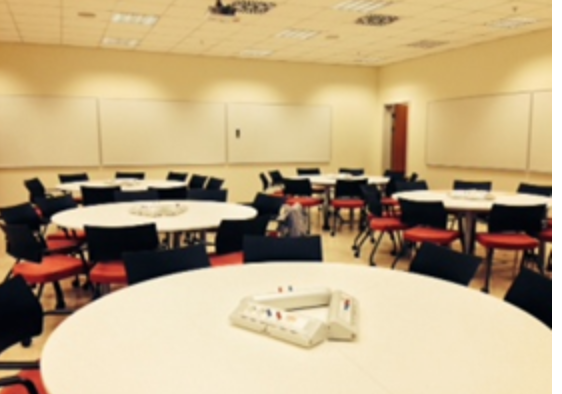 The active learning classrooms (shown here) are specially designed and equipped to enhance learning and group working. These classrooms have round tables of 9 students, high-speed wireless internet, multiple wireless projectors which can be connected to any mobile devices. The walls of active learning classrooms are surrounded by white boards to support collaboration and discussion among students. Students form groups of 3 and work collaboratively on given problems or activities.
The active learning classrooms (shown here) are specially designed and equipped to enhance learning and group working. These classrooms have round tables of 9 students, high-speed wireless internet, multiple wireless projectors which can be connected to any mobile devices. The walls of active learning classrooms are surrounded by white boards to support collaboration and discussion among students. Students form groups of 3 and work collaboratively on given problems or activities.
These classrooms stimulate group discussions and help them apply and strengthen their understanding of the class materials. Meanwhile, the collaborative learning enables the students to learn how to argue and voice an opinion in a group discussion and how to manage time. In addition, during the learning process they gain awareness about the importance of individual responsibility in a teamwork. Additionally, there is a document camera in each classroom which is used to project a group’s work to the rest of the class for exchanging ideas among students. Continuous feedback is given to student groups during active lectures and recitations via instructors, teaching, and learning assistants. We also use a classroom response system (Top Hat) to promote student participation, give feedback to the class at large as well as stimulate the classroom discussion.
NS Teaching Assistant Training Program
The NS course utilizes an interdisciplinary and student-centered approach to facilitate active/collaborative learning, with ~1000 students enrolled each semester. With innovative approaches and the large enrollment, well-trained, teaching assistants are indispensable to the NS course. To equip aspiring graduate and undergraduate students with professional skills to become effective facilitators in student‐centered learning environment, we offer the custom made “Teaching Scholars Residency Program” and “Learning Assistant (LA) Program” since 2013 and 2014, respectively.
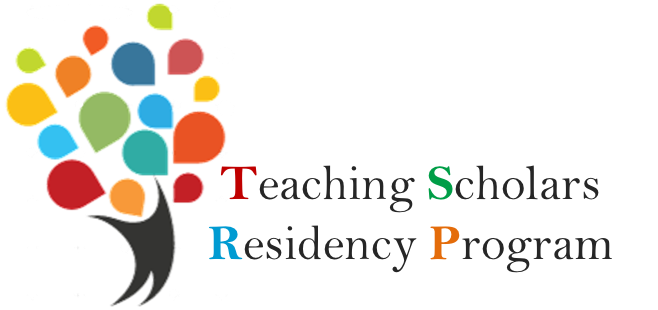
The Teaching Scholar Residency Program aims to provide an early
professional development opportunity for all FENS graduate students, who
are interested in Scholarship of Teaching and Learning and are motivated
to contribute to the NS courses. Upon successful completion of this program,
scholars will become Master Teaching Assistants (MTAs) of the NS courses
and receive a certificate from the Foundation Development Directorate.
MTAs will directly work with the faculty in course improvement and assessment,
while leading training and coordination of peer graduate teaching assistants
as well as undergraduate learning assistants. To become a MTA for the NS
courses, successful completion of the Teaching Scholar Residency Program
is required.
About the Program
The goal of the Teaching Scholars Residency Program is to inform aspiring
graduate students on the current advances in SoTL and to give them the
professional skills to become effective teachers by actively engaging them
in the refinement and assessment of the interdisciplinary NS 101 / 102
courses.
The residency is composed of two elements:
-
Training (Pre-semester): Composed of a series of two hour in-class
group training sessions and some individual work, under the direct guidance
and supervision of Dr. Yuki Kaneko, who will provide feedback and coaching.
The training topics includes:
- Student-centered course design
- Active learning
- Collaborative learning
- Formative/summative assessment
- Flipped classroom
- Classroom management
- Internship (During semester):Composed of in-class leading and coordination work with NS teaching assistants and students, under the direct guidance and supervision of the faculty teaching the NS course the scholar is assigned to. Working hours will not exceed the hours specified by your faculty scholarship status. This requirement will be fulfilled at specified times throughout the semester by conducting NS101 / 102 recitations.
Who should apply?
Someone who is:
- Going to work as a Teaching Assistant as a part of the scholarship offered by FENS (We do not provide any financial support to the scholars).
- Curious to learn about what current research tells us about students’ learning.
- Interested and motivated to learn through hands-on experience how to effectively impact the academic achievement growth of students.
- Highly valuing teamwork and collaborative learning.
- Looking for an opportunity to share his/her excitement about science with others.
- Reliable, responsible, and punctual.
- With good communication skills in English or aspiring to become better at them.
- Committed to work in the NS team for at least two semesters.
- Preferred majors: Materials Science and Engineering, Molecular Biology, Genetics and Bioengineering, and Physics
What are the benefits of the program?
- Daily lunch tickets during the residency (partial support during the pre-semester training).
- Eligibility to become a Master Teaching Assistant for the NS courses.
- A certificate of completion of the residency signed by the Vice President of the University and the Director of Foundations Development Directorate, upon successful completion.
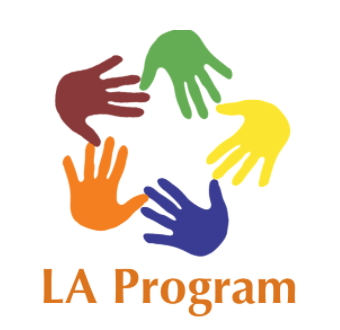 The Learning Assistants are undergraduate students who have taken NS101
/ 102, who facilitate group work and discussions among the students currently
taking NS101 / 102. NS LA program is setting an example to other courses
at our University; freshman Math courses, IF100 course, as well as several
upper-level courses are now working with LAs. Some of the NS LAs go on
to contribute to other courses as their LAs. Sabancı University NS LA program
is a part of
the LA Alliance.
The Learning Assistants are undergraduate students who have taken NS101
/ 102, who facilitate group work and discussions among the students currently
taking NS101 / 102. NS LA program is setting an example to other courses
at our University; freshman Math courses, IF100 course, as well as several
upper-level courses are now working with LAs. Some of the NS LAs go on
to contribute to other courses as their LAs. Sabancı University NS LA program
is a part of
the LA Alliance.
NS Core Teaching & Development Team
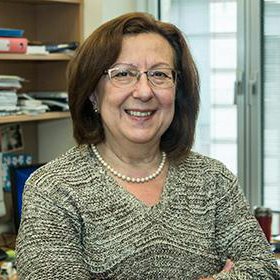
Prof. Dr. Zehra SayersFormer FDD Director |
Areas of InterestMolecular biology and investigation of structure of biological molecules using synchrotron X-ray scattering; investigation of structure-function relationships in fibrous molecules including chromatin, actin etc.; investigation of structures of metal-binding proteins. |
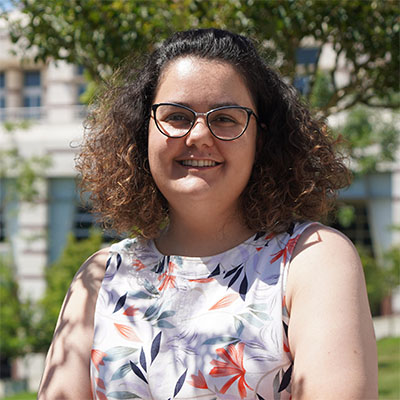
Dr. Aslıhan Ünsal |
Areas of InterestHigh-energy astrophysics, gamma-ray bursts, science education in college. |
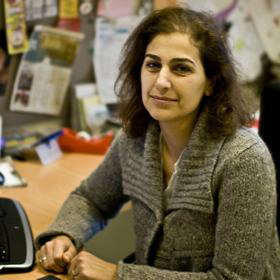
Prof. Dr. Canan Atılgan |
Areas of InterestPolymer and protein dynamics; theoretical and computational investigation of complex molecular systems. |
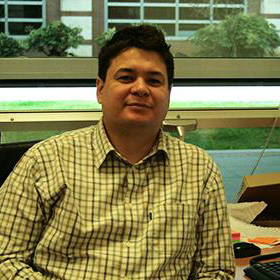
Prof. Dr. Emrah Kalemci |
Areas of InterestHigh Energy Astrophysics, black hole binaries, instrumentation. |
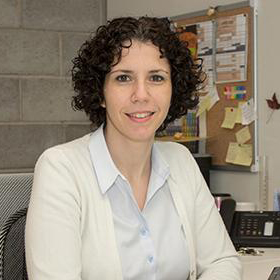
Prof. Dr. Gözde İnce |
Areas of InterestChemical vapor deposition of organic and inorganic thin films, fabrication and characterization of polymer nanostructures, applications of thin films as stimuli responsive coatings. |
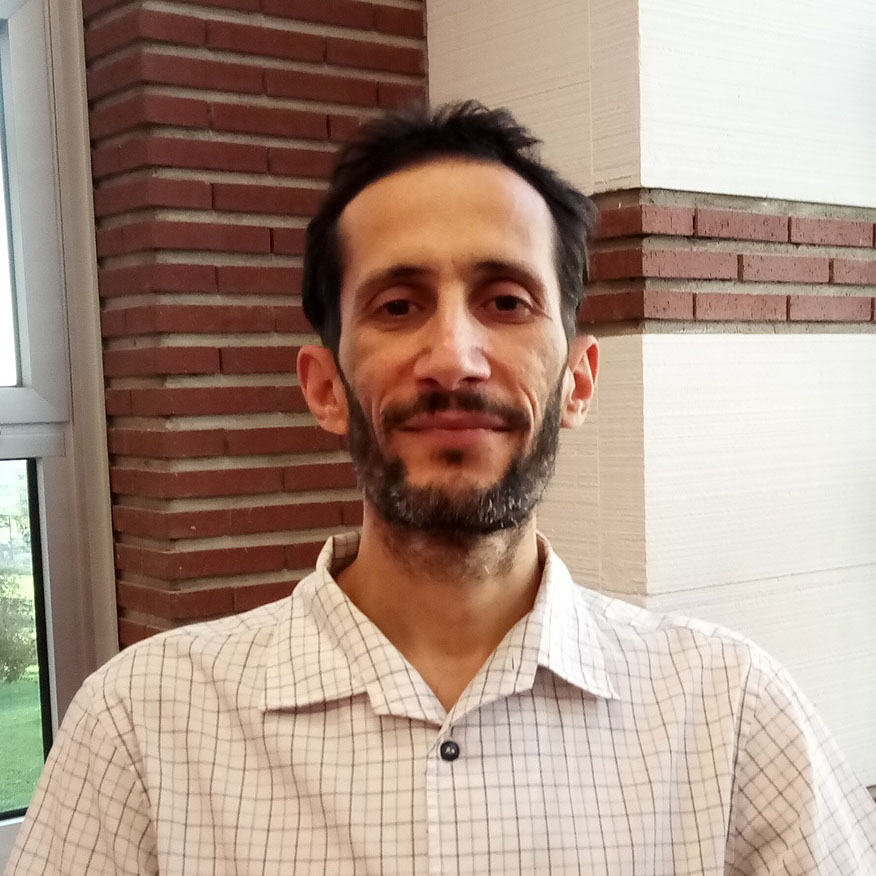
Dr. Kerem Bora |
Areas of InterestMicrobial Experimental Evolution, Microbial Ecology, Fermentation Technologies. |
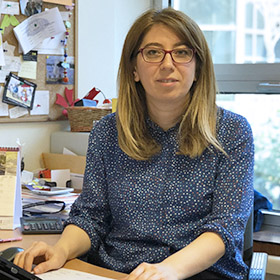
Dr. Süphan Bakkal |
Areas of InterestBacterial toxins and antibiotic resistance, Science Education. |
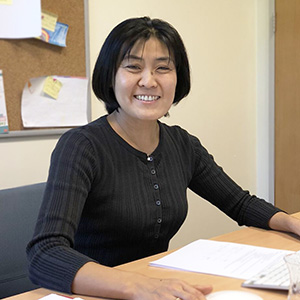
Assoc. Prof. Yuki Kaneko |
Areas of InterestHigh-Energy Astrophysics, Gamma-Ray Bursts, Soft-Gamma Repeaters, Science Education. |
